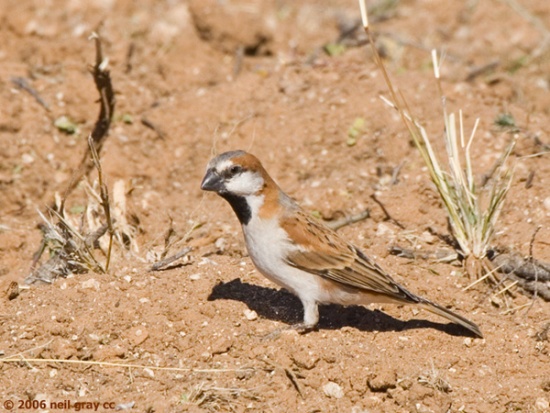m |
m (Southern Rufous Sparrow moved to Great Sparrow) |
(No difference)
| |
Revision as of 15:26, 28 February 2011
Alternative names: Great Rufous Sparrow; Southern Rufous Sparrow; Namibia Rufous Sparrow (benguellensis)
- Passer motitensis
Identification
15 - 16cm. One of the largest sparrows.
- Blue-grey crown and nape
- Black lores
- Chestnut crescent-shaped band from eye to side of neck, encircling paler grey ear-coverts
- Small black bib on chin and central throat
- Chestnut upperparts
- Bodly streaked black mantle and inner scapulars
- Blackish to dark brown upperwing
- Broad white tips on medain coverts
- Dark brown tail
- Pale grey underparts
Females have the same plumage pattern but are duller and the chestnut on the head is replaced by creamy buff. Juveniles resemble females but look more washed-out.
Similar species
Similar to Kenya Rufous Sparrow but ranges don't overlap. Also similar to the introduced House Sparrow, but it's larger, the colours are brighter, and the rump is rufous rather than grey.
Distribution
Southern Africa.
Locally common.
Taxonomy
Passer motitensis has three subspecies:1
- P. m. benguellensis
- P. m. subsolanus
- Southern Zimbabwe to north-eastern South Africa and north-western Swaziland
- P. m. motitensis
- Botswana to central and western South Africa
Some authorities include Kenya Rufous Sparrow (and sometimes also Iago Sparrow and Socotra Sparrow) in this species and call this species Rufous Sparrow.
Habitat
Dry, wooded savanna. Not associated with man.
Behaviour
Feeds on seeds of grass and cultivated cereals. Nestlings are fed with insects.
Less sociable than most sparrows and usually encountered in pairs.
Breeding season from September to February. A solitary breeder. The nest is a dome of the size of a rugby football with an entrance at the top end and made of grass. It's placed in a thorny tree, sometimes in a rock crevice. Lays 3 - 6 eggs.
A nomadic species.
References
- Clements, JF. 2009. The Clements Checklist of Birds of the World. 6th ed., with updates to December 2009. Ithaca: Cornell Univ. Press. ISBN 978-0801445019.
- Del Hoyo, J, A Elliott, and D Christie, eds. 2009. Handbook of the Birds of the World. Volume 14: Bush-shrikes to Old World Sparrows. Barcelona: Lynx Edicions. ISBN 978-8496553507
Recommended Citation
- BirdForum Opus contributors. (2024) Great Sparrow. In: BirdForum, the forum for wild birds and birding. Retrieved 19 April 2024 from https://www.birdforum.net/opus/Great_Sparrow




